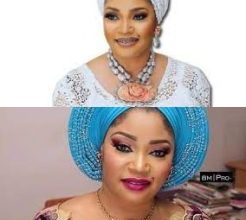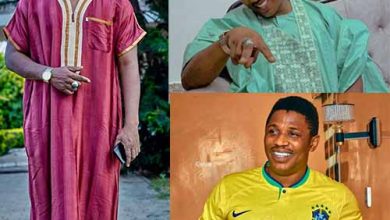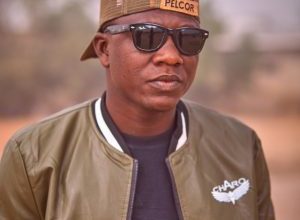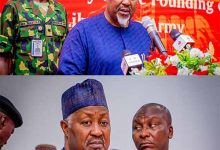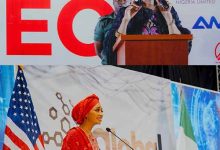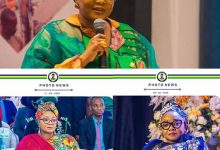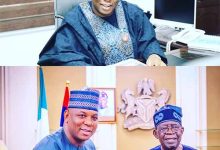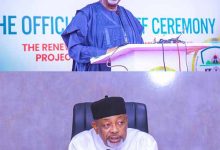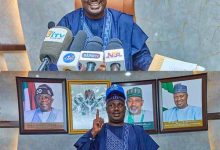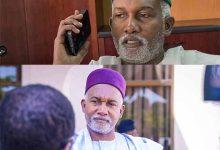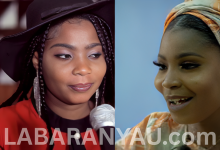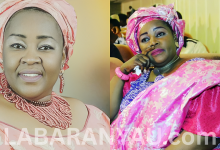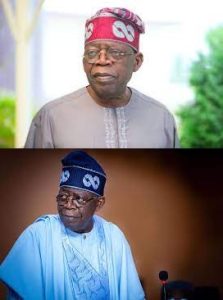
Bola Ahmed Tinubu Biography
The 16th and current president of Nigeria is a Nigerian politician by the name of Chief Bola Ahmed Adekunle Tinubu GCFR (born March 29, 1952). From 1999 until 2007, he served as governor of Lagos State and as a senator for Lagos West during the Third Republic.
Tinubu was born and raised in the southwest of Nigeria. After moving to the United States, he attended Chicago State University to study accounting. After moving back to Nigeria in the early 1990s, he worked as an accountant for Mobil Nigeria before entering politics in 1992 as the Social Democratic Party’s candidate for the Lagos West senate seat. After the tyrannical Sani Abacha disbanded the Senate in 1993, Tinubu joined the National Democratic Coalition movement and started advocating for the restoration of democracy.
As a representative of the Alliance for Democracy, Tinubu won the first post-transition Lagos State governorship election with a sizable margin. He was elected to a second term four years later. He was instrumental in the creation of the All Progressives Congress in 2013 after leaving office in 2007. He was chosen to lead Nigeria as president in 2023.
Bola Ahmed Tinubu Background
In the merchant family of Abibatu Mogaji, the “yál’jà” of Lagos, Tinubu was born in Lagos. Although it is widely acknowledged by trustworthy sources that he was born in 1952, political opponents occasionally contest this information, claiming that he was actually born much earlier. Reliable sources point out that his age hasn’t been independently verified.
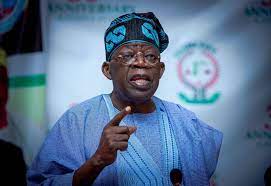
Bola Ahmed Tinubu Education
Before moving on to Children Home School in Ibadan, Tinubu attended St. John’s Primary School in Aroloya, Lagos. He finished his undergraduate work in the US at Chicago’s Richard J. Daley College and Chicago State University. He earned a Bachelor of Science in Accounting from the university in 1979.
Bola Ahmed Tinubu Early career
At the American firms Arthur Andersen, Deloitte, and GTE Services Corporation, Tinubu held positions. He joined Mobil Oil Nigeria upon his return to Nigeria in 1983, rising to the position of corporate executive.
Bola Ahmed Tinubu Early political career
When Tinubu joined the Social Democratic Party in 1991, his political career officially got underway. In the brief Nigerian Third Republic, he was elected to the Senate in 1992, representing the Lagos West district.
After the 12 June 1993 presidential election results were overturned, Tinubu joined the National Democratic Coalition, a group that rallied support for the return of democracy and the declaration of Moshood Abiola as the election’s victor. General Sani Abacha seized power as the military’s head of state, and following his death in 1998, which marked the beginning of the Fourth Nigerian Republic, he fled the nation in 1994. In 1998, he returned.
Bola Tinubu was a protégé of Alliance for Democracy (AD) founders Abraham Adesanya and Ayo Adebanjo in the years leading up to the 1999 elections. After defeating Funsho Williams and Wahab Dosunmu, a former minister of works and housing, he went on to win the AD primary for the governor of Lagos State. He ran for governor of Lagos State on the AD platform in January 1999, and he was elected.
Governor of Lagos State
Tinibu started new road development throughout his eight years in office to suit the requirements of the state’s rapidly expanding population.
In April 2003, Tinubu was re-elected governor together with a brand-new deputy governor named Femi Pedro. In those elections, the People’s Democratic Party won every other state in the South West. He fought the federal government, which was then under the administration of Olusegun Obasanjo, over the issue of whether Lagos State had the right to establish new Local Council Development Areas (LCDAs) to accommodate its sizable population. The federal government confiscated cash intended for the state’s municipal councils as a result of the incident.
He participated in ongoing conflicts with PDP leaders like Bode George, the southwest PDP chairman, and Adeseye Ogunlewe, a former senator from Lagos State who had been appointed minister of works, during the later half of his stint in office.
In 2006, Tinubu made an effort to persuade Atiku Abubakar, who was Nigeria’s vice president at the time, to lead his party, the Action Congress (AC). The People’s Democratic Party (PDP) member Abubakar recently had a disagreement with President Olusegun Obasanjo over Abubakar’s desire to succeed Obasanjo as president. With the understanding that he would serve as Atiku Abubakar’s running mate, Tinubu offered Abubakar the chance to join the AC and the chance to run for president on behalf of his party. Atiku declined the offer and, after joining the AC, selected Senator Ben Obi from the South East as his running mate. The PDP won the election handily, despite the fact that Atiku ran on Tinubu’s platform.
Femi Pedro, the deputy governor, announced his desire to run for governor, which caused tension between Tinubu and Pedro to worsen. On the eve of the party nomination, Pedro withdrew his name from consideration to run as the AC candidate for governor in the 2007 elections. He kept his job as deputy governor but switched to the Labour Party. On May 29, 2007, Tinubu’s term as governor of Lagos State came to an end, and the Action Congress’ Babatunde Fashola took over.
Pre-presidency
2007 general election
After the People’s Democratic Party (PDP) swept to victory in the April 2007 elections, Tinubu became involved in talks in 2009 to unite the dispersed opposition groups into a “mega-party” that could take on the PDP, which was in power at the time. There were rumors that a conspiracy to kill Tinubu had been discovered in March 2009. With the merger of the Action Congress of Nigeria (ACN), the Congress for Progressive Change (CPC), the All Nigeria Peoples Party (ANPP), a faction of the All Progressives Grand Alliance (APGA), and the new PDP (nPDP), a faction of the then-ruling People’s Democratic Party (PDP), into the All Progressives Congress (APC), Tinubu was one of several politicians who created a “mega opposition” party in February 2013.
All Progressives Congress
In 2014, Tinubu backed General Muhammadu Buhari, the leader of the CPC faction of the APC and a former military head of state who had previously run for president in the CPC in 2003, 2007, and 2011. Buhari had a strong following in Northern Nigeria. Tinubu initially desired to run as Buhari’s running mate but ultimately relinquished the nomination to his ally and former justice commissioner Yemi Osibanjo. Buhari led the APC to victory in 2015, ending the PDP’s 16-year hegemony and becoming the first incumbent president of Nigeria to lose to an opposition candidate.
In place of his long-held reported presidential ambition, Tinubu went on to play a significant role in the Buhari administration by supporting government programs and maintaining control of the internal party structure. He endorsed Buhari’s reelection campaign in 2019, helping him overcome Atiku Abubakar of the PDP. The expulsion of Adams Oshiomole, a Tinubu ally and party chairman, in the wake of a party crisis in 2020 is thought to have been done in order to undermine Tinubu’s chances of winning the presidency in 2023.
2023 presidential election
Tinubu officially declared his campaign for president on January 10, 2022.
On June 8, 2022, Tinubu won the party convention vote for the governing APC with 1,271 votes, defeating Rotimi Amaechi and Vice President Yemi Osinbajo, who received 235 and 316 votes, respectively.
Tinubu was proclaimed the victor of the 2023 presidential election by INEC on March 1st. He was named president-elect after defeating his rivals with 8,794,726 votes. Atiku Abubakar of the opposition People’s Democratic Party (PDP) finished in second place with 6,984,520 votes. Peter Obi of the Labour Party received 6,101,533 votes, placing third.
Presidency (2023–present)
In accordance with the constitution, Tinubu took office on May 29, 2023. At an inauguration event in Eagle Square in the Federal Capital Territory, he will be sworn in as President of Nigeria by Chief Justice of Nigeria Olukayode Ariwoola.After the March election, his government overcame the opposition’s legal obstacles and is now generally regarded as legitimate internationally. There will be a number of leaders of state and government present during the swearing-in ceremony.
On May 25, Tinubu received the second-highest national honor, the Grand Commander of the Order of the Niger, from his predecessor Muhammadu Buhari and the highest honor, the Grand Commander of the Order of the Federal Republic, was given to Kashim Shettima.
Ideology and public image
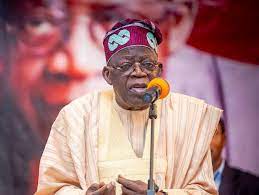
Views
Throughout his political career, Tinubu has promoted a thorough political and economic program. The egalitarianism, social fairness, liberty, and respect of fundamental rights are all part of Tinubu’s progressive utopia. He sees the government as a strong supporter of the general welfare and believes that government involvement in Nigerian society is essential to ensuring social harmony, equality, and justice. His work for democracy during the military dictatorship in Nigeria is not all that far from this concept.
Although most international economists have not yet determined the exact form of this divergence in terms of economics, his administration is skillfully expected to be a political and ideological departure from Buharism. In order to relaunch the Nigerian economy in the midst of a global downturn, the World Bank and IMF have highlighted the urgency of the situation for the next government to implement macro-structural adjustments on the scale of the late 1980s reform.
The Lion of Bourdillon
The “Godfather of Lagos” label has been extensively applied to Tinubu.[48] The Lion of Bourdillon, a 2015 documentary detailing Tinubu’s political and financial hold on the city-state, revealed his role in controlling the massive city-state. Tinubu sued the makers, Africa Independent Television (AIT), for libel for 150 billion Nigerian Naira. The documentary’s broadcast ended on March 6, 2015. When it was reported that Fashola and Tinubu had a disagreement on Fashola’s reelection as Lagos’ governor in 2011, with Tinubu favoring Muiz Banire as the commissioner for the environment, he made an attempt to coerce the political process.
Akinwunmi Ambode’s successor, Fashola, and Tinubu engaged in a similar battle in 2015, with Tinubu supporting Ambode wholeheartedly. After Tinubu removed Ambode and replaced him with incumbent Babajide Sanwo, Ambode succeeded Fashola.-Olu
Allegations of corruption
Due to a legal claim that the American government had “probable cause” to believe Tinubu’s American bank accounts contained the proceeds of heroin smuggling, the American government froze his assets in 1993. Later that year, he reached a settlement with the US authorities and forfeited around $460,000. His association with two Chicago heroin dealers was implied by court records and subsequent reporting on the case.
The Federal Government summoned Tinubu before the Code of Conduct Bureau for trial in April 2007 after the general elections but before the governor-elect Babatunde Fashola had started office over the alleged illegal operation of 16 different offshore accounts.
The Economic and Financial Crimes Commission exonerated Tinubu, Delta State Governor James Ibori, and Akwa Ibom State Governor Obong Victor Attah in January 2009 of allegations of conspiracy, money laundering, abuse of power, and official corruption in connection with the 2004 sale of Vmobile network shares. In September 2009, rumors surfaced that the British Metropolitan Police was looking into a deal involving an investment made in Econet (now Airtel) by the Lagos State government. According to Tinubu, there were no middlemen involved in the uncomplicated transaction, which was profitable for the government. The Federal Government denied a British request to provide information necessary for additional investigation and legal action against the three former governors of Nigeria in a London court.
A bullion van was seen entering Tinubu’s home on Bourdillion Road in Ikoyi during the 2019 election, which led him to subsequently declare: “I keep money anywhere I want.”
Bola Ahmed Tinubu Personal life
In 1987, Tinubu wed Oluremi Tinubu, a senator currently serving the Lagos Central senatorial district. Zainab Abisola Tinubu, Habibat Tinubu, and Olayinka Tinubu are their three children. He had three children with previous partners: Kazeem Olajide Tinubu (born 12 October 1974 and died on October 31, 2017), Folashade Tinubu (born 17 June 1976), and Oluwaseyi Tinubu (born 13 October 1985), whose mother is rumored to be the former air hostess and prophetess Bunmi Oshonike.
Abibatu Mogaji, Tinubu’s mother, passed away on June 15, 2013, at the age of 96.[65] On October 31, 2017, Jide Tinubu passed away in London. Muslim is Tinubu
Traditional titles
Tinubu is the “Asiwaju” of Lagos and the “Jagaba” of the Borgu Emirate in Niger State, two traditional chieftaincies.
Where is Ahmed Bola Tinubu from?
Nigeria’s incoming president is Chief Bola Ahmed Adekunle Tinubu GCFR, a politician and accountant from Nigeria who was born on March 29, 1952. From 1999 until 2007, he presided as the governor of Lagos State. During the brief Third Republic, he represented Lagos West in the Senate.
Who is Bola Tinubu first wife?
Politician Oluremi Tinubu CON OON (born September 21, 1960) has served as Nigeria’s first lady since 2023. She also held the position of first lady of Lagos State from 1999 to 2007 as the spouse of Bola Tinubu, the current president of Nigeria and former governor of Lagos.
Does Tinubu have dual citizenship?
He claims that Mr. Tinubu has freely acquired the citizenship of the Republic of Guinea and enjoys dual citizenship with Nigeria.
Who is the next president of Nigeria 2023?
At a ceremony in the nation’s capital, Abuja, Nigeria, the largest democracy in Africa, swore in its new president. Bola Tinubu, 71, won the election in February on a platform of restoring hope, but he now faces significant economic and security difficulties.
Is Tinubu the owner of Oando?
Jubril Adewale “Wale” Tinubu CON, a Nigerian business leader and attorney, was born on June 26, 1967. He currently serves as the group chief executive of Oando PLC.
Discover more from Labaran Yau
Subscribe to get the latest posts sent to your email.






